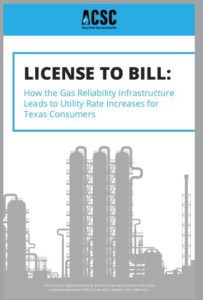 The Gas Reliability Infrastructure Program, or GRIP, allows monopoly gas utilities to increase rates even if the company’s overall expenditures are declining, even if its revenues are increasing or even if the company is earning windfall profits. Under GRIP rules, a gas utility need only claim it has made extra investments associated with one part of its business — capital costs — and then it can obtain a rate increase.
The Gas Reliability Infrastructure Program, or GRIP, allows monopoly gas utilities to increase rates even if the company’s overall expenditures are declining, even if its revenues are increasing or even if the company is earning windfall profits. Under GRIP rules, a gas utility need only claim it has made extra investments associated with one part of its business — capital costs — and then it can obtain a rate increase.
Regulators grant these increases as a ministerial act without consideration of the utility’s overall revenues, without consideration of offsetting savings in other areas of the utility’s business or even without considering whether the infrastructure investments are prudent.
The Atmos Cities Steering Committee has created a new policy guide that explains this program in more detail and includes recommendations for reform. You can download a copy here.
